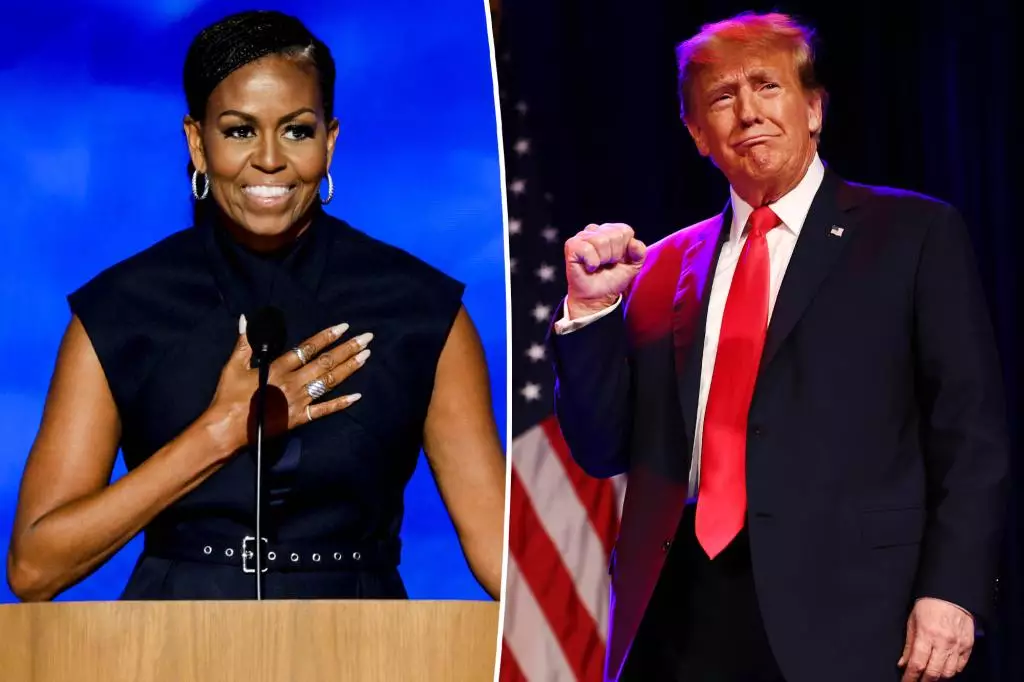In a political landscape often marked by theatrical displays of civility, Michelle Obama’s absence during Donald Trump’s inauguration garnered attention for its starkness and implied discontent. While former President Barack Obama seemingly extended a hand of reconciliation towards Trump, Michelle remained resolute in her decision to skip the event entirely. Reports surrounding her absence suggested that it was a “deliberate” choice, rejecting any notion of pretending to unify under a leadership style she firmly stands against.
This decision unfolded not in a vacuum, but as part of a longer narrative outlining the strained relationship between Trump and the Obamas. At Jimmy Carter’s funeral, the sight of Barack conversing amiably with Trump stood in sharp contrast to Michelle’s absence, which was attributed to an “extended holiday vacation” in Hawaii. This lack of participation raised questions about the underlying tensions and differences in how both Obamas perceive and respond to Trump’s presidency.
Michelle’s choice not to attend the inauguration was rooted in her steadfast commitment to authenticity. A source close to the family conveyed that Michelle has never been one to conform to expectations simply for appearances. Instead, her absence was described as a statement, an acknowledgment that she is not willing to extend an olive branch to what she sees as an administration that represents divisive and regressive values.
The former First Lady’s disdain for Trump’s rhetoric has been clearly articulated in her past speeches, notably during the Democratic National Convention in 2016. There, she directly addressed the harm caused by Trump, highlighting his role in perpetuating the “birther” movement—a conspiracy that questioned President Barack Obama’s legitimacy. This sentiment wasn’t just mere political rhetoric; it resonated deeply with her understanding of race, identity, and the struggles of marginalized communities in the United States.
While Michelle Obama initially adopted a more conciliatory approach after the 2016 election—attending Trump’s inauguration, for instance—her feelings evolved in light of Trump’s presidency. During the 2020 election cycle, she became more vocal about her concerns regarding Trump’s leadership style, pointing out the harmful implications of normalizing what she called “backwards leadership.” This shift illustrates her journey from reluctant participant to assertive critic, showcasing her growth into a powerful voice for progressive values.
Michelle’s speech at the DNC served as a platform to express the frustrations of many Americans, particularly those who have historically been disenfranchised. She emphasized how individuals from marginalized communities rarely receive the second chances afforded to those with privilege. By challenging the status quo, Michelle Obama highlighted the discrepancies in the societal expectations placed upon different groups and underscored her commitment to advocating for equity.
The political ramifications of Michelle’s absence at Trump’s inauguration extend beyond personal sentiment. While Barack Obama shared the stage with Trump and other former presidents, Michelle’s decision not to participate sent a clear signal to the American public. It was a reminder that not all voices in American political spectrums align with the rhetoric of unity when faced with stark ideological differences.
Moreover, in comparison to the more subdued reactions of other political figures towards Trump during his term, Michelle’s bold stance reinforces her role as a modern political figure willing to challenge norms. Her decision echoes the sentiments of many citizens disillusioned by political dynamics that favor superficial gestures over substantive change.
In the grand narrative of American politics, Michelle Obama’s choice to skip Trump’s inauguration underscores a larger discourse about authenticity, legacy, and resistance to divisive leadership. Her absence is not merely about missing an event; it symbolizes a rejection of conflicting values and an unwavering stand for principles she embodies. As Barack navigates a political system that often requires compromising positions, Michelle’s position remains clear—true leadership requires authenticity, integrity, and a commitment to the ideals that uplift and unify rather than divide. In doing so, she continues to inspire a generation seeking to redefine what it means to be a leader in today’s world.

